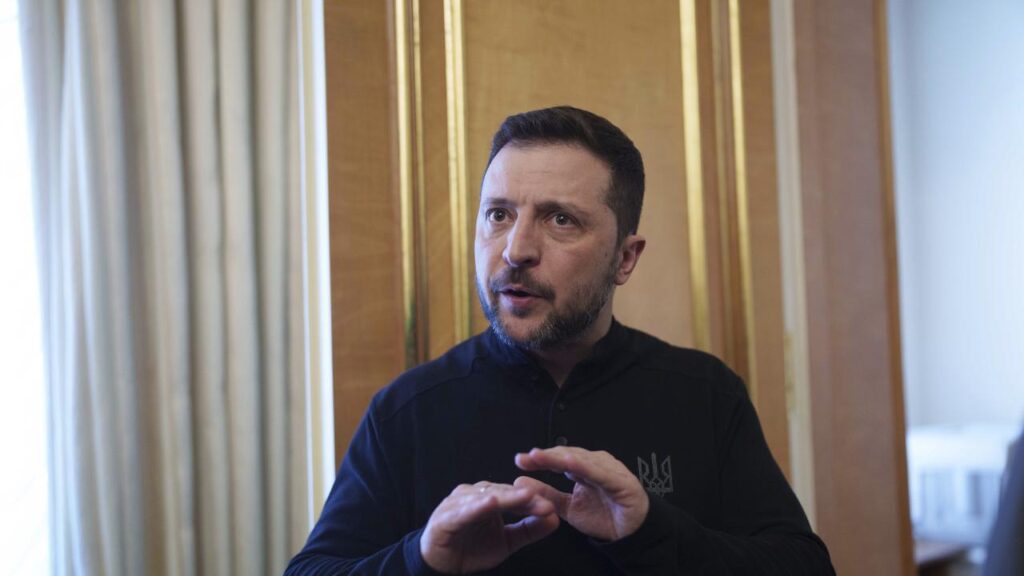Trump confirms Zelenskiy visit to sign minerals deal
Olena Harmash and Tom Balmforth and Yuliia Dysa |

US President Donald Trump said Volodymyr Zelenskiy will visit Washington to sign an agreement on rare earth minerals, while the Ukrainian leader says the success of the deal will hinge on those talks and continued US aid.
Under the deal, which Ukraine’s prime minister has called “preliminary”, Kyiv would hand some revenue from its mineral resources to a fund jointly controlled by the US The agreement is central to Ukrainian attempts to win strong support from Trump as he seeks a quick end to Russia’s war.
US-Russian talks that have so far excluded Kyiv were set to continue on Thursday.

Trump said Zelenskiy would sign the agreement on rare earths and other topics during his visit on Friday, but suggested Washington would not make far-reaching security guarantees.
Kyiv has been seeking US security guarantees as part of the deal, cast by Trump as a payment for US aid to Kyiv during the war. Russia invaded Ukraine in 2022.
“I’m not going to make security guarantees beyond – very much. We’re going to have Europe do that,” Trump said, without elaborating.
Zelenskiy, speaking in his nightly video address, said his talks with Trump would stress the importance obtaining security guarantees “to ensure that Russia no longer destroys the lives of other nations” and added that continued US aid was vital.
“For me and for all of us in the world, it is important that American aid is not halted. Strength is needed on the path to peace,” he said.
Last week, the Speaker of the US House of Representatives Mike Johnson said there was “no appetite” for another funding bill for Ukraine.
Johnson’s comments came a day after Trump called Zelenskiy a “dictator” and warned he must move quickly to secure peace with Russia or risk losing his country.
On Wednesday, Zelenskiy said the most important thing was that the current draft agreement did not portray Ukraine as a debtor that would have to pay back hundreds of billions of dollars for past military assistance.
“This agreement could be part of future security guarantees … an agreement is an agreement, but we need to understand the broader vision,” he said.
“This deal could be a great success or it could pass quietly. And the big success depends on our conversation with President Trump.”
Zelenskiy said it would be a success if the US provides security guarantees for Ukraine, which wants protection from future Russian attacks if a peace deal is reached.
Trump has repeatedly claimed the US has sent $US350 billion ($A557 billion) to Ukraine, without explaining the figure.
Congress has approved $US175 billion in assistance since Russia’s full-scale invasion began three years ago.
Fighting has continued during the flurry of diplomacy, with Ukraine frequently coming under attack from Russian missiles and drones in Europe’s deadliest conflict since World War II.

Trump said on Tuesday that Zelenskiy wanted to come to Washington on Friday to sign a “very big deal”.
Trump has been fiercely critical of Zelenskiy as the US president has upended Washington’s policy on the war and ended a campaign to isolate Russia.
Trump spoke to Russian President Vladimir Putin on February 12 and a Russian-US meeting took place in Saudi Arabia on February 18.
Russian Foreign Minister Sergei Lavrov said Russian and US diplomats would meet in Istanbul on Thursday to discuss resolving bilateral disputes that are part of a wider dialogue the sides see as crucial to ending the Ukraine war.
Lavrov again ruled out “any options” for European peacekeepers being sent to Ukraine.
Trump has said some form of peacekeeping troops are needed in Ukraine if an agreement to end the conflict is struck.
British Prime Minister Keir Starmer is expected to meet Trump on Thursday and on Sunday will host leaders of France, Italy, Germany, Poland and other allies to discuss their response to Trump’s moves.
European leaders, including Starmer, held an emergency meeting in Paris this month where they were split on the idea of deploying peacekeepers to Ukraine.
Reuters